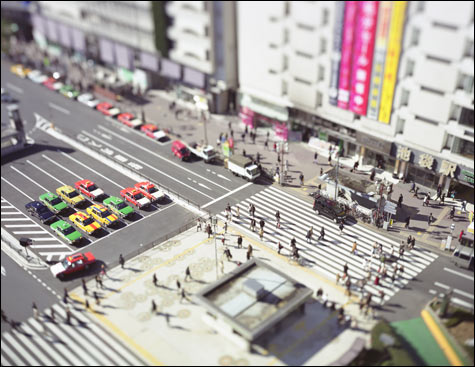
TOKYO, JAPAN (TAXI STAND) Naoki Honjo’s photographs at the Bernard Toale turn the real world into a toy. |
Tokyo photographer NOAKI HONJO turns Japanese metropolises into adorable li’l things. In his show at Bernard Toale Gallery (50 Harrison Avenue, Boston), which is up through June 28, camera trickery makes a bullet train, an amusement park, a giant swimming pool, and a baseball field at night look like cute models or toys. A line of taxis resembles Matchbox cars.
So many people are using this gimmick that it’s acquired a dreadfully dull name, “tilt-shift miniature faking,” because it involves tampering with the tilt of the lens in relation to the film — though people also fake it with digital editing. (In a related development, other photographers are shooting models to make them look like real scenes.) Usually this technique creates a band in focus across the image while the rest of the scene falls into sweet fuzziness. That shallow zone of focus combined with elevated views makes it seem you’re looking down on a dreamy model train set populated by little plastic figurines.
It’s intriguing to see the world from a bird’s-eye or God’s-eye or Google Earth view, to note how it’s organized, to recognize patterns. But why is it so charming to imagine the world as a toy? There’s nostalgia in it, for sure. Maybe it makes life feel more manageable?
Also up through June 28 at the Toale are photographs by Brookline’s ABELARDO MORELL, one of the region’s most prominent artists. He’s long explored the nature of representation and perception; here that takes the form of close-up details of paintings, and shots of ink drawings on glass plates that resemble aerial views of continents. Morell is best known for astonishing black-and-white shots inside rooms that have been turned into giant pinhole cameras, so that the scenery outside projects upside down across the interior. They feel like the rooms’ memories made manifest. In the past few years, he’s begun making color versions as well as versions in which he flips the projected image upright. This is the first time they’ve appeared in a Boston gallery. The four here are good, but not as vivid as his past black-and-white shots. Those were animated by a dramatic range of dark to light, whereas these color pictures are more mellow. And with the projected images right side up, they don’t seem quite so wonderfully otherworldly.
PIXNIT, everyone’s favorite Boston graffiti artist angling to be a home decorator, has painted a new mural at Judi Rotenberg Gallery (130 Newbury Street, Boston) that’s up through June 1. Continuing with motifs from her recent mural at the DeCordova Museum, she stencils a chaise longue, birdcages, and a crooked chandelier onto a floral “wallpaper” design. Bird silhouettes cut from wood-grain stickers flutter across the composition, which is dazzling and graphic in a Ryan-McGinness-crossed-with-French-rococo kind of way. It’s as light and airy and unnourishing as, uh, some light, airy, unnourishing French pastry. But, dang, is it purdy.
Ten local emerging architecture and design firms have collaborated on “PARTI WALL, HANGING GREEN,” a “prototype green wall” on a five-story factory-turned-condo-building at 90 Wareham Street. The project is explained in a companion exhibit (which includes illustrations of the firms’ past projects) that’s up through June 6 across the street at pinkcomma gallery (81B Wareham Street, Boston). With the American Institute of Architects holding their national convention here in May, the gang wanted to do something to attract notice and show that Boston design has gotten hip. So they hung a grid of sedum (a stubby ground cover) panels from cables off the side of the brick building, to demonstrate how to green up blank partition walls in neighborhoods that are almost entirely paved over. And, in the process, “provide visual relief, color, and texture, as well as a range of ecological benefits including insulation, acoustic improvements, the reduction of storm-water runoff, and the mitigation of the heat-island effect.” Oh and “improve air quality.” That would be terrific, but it seems a tall order for what’s here, which looks like a lame aerial checkerboard of old carpet samples. It’s a start, I suppose. The organizers have no plans to measure the project’s ecological benefits, but I’m told it has demonstrated how such installations can be hung.
The Boston Center for the Arts’ Mills Gallery (539 Tremont Street) has up through June 15 “ARTADIA BOSTON 2007,” with the work of nine Boston-area artists or collectives who won the inaugural round of Boston art grants from the New York–based Artadia foundation. It’s a good mix of conceptual and visual art, though the show has more potential than payoff. Among the best stuff are Hannah Barrett’s paintings, which mix-and-match Civil War–era photo portraits to make witty weird male-female hybrids. The paintings mull gender and sexuality, but mostly they intrigue as freak-show personalities.
There’s also a pair of conceptual projects among the highlights, but they’re left underexplained. John Osorio-Buck’s U7K55: Sustainable Kiosk System looks like a coffee stand (with attached greenhouse) for the Apocalypse. It’s as if Joseph Beuys weren’t just trying to heal our psychic wounds but were aiming to provide actual disaster relief.